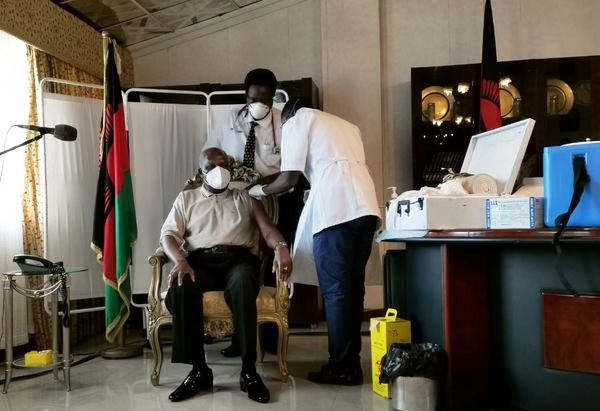Muluzi gets Covid-19 vaccine
Former president Bakili Muluzi yesterday became the latest high-profile personality to get the Oxford/AstraZeneca Covid-19 vaccine and encouraged Malawians to disregard myths by getting vaccinated to protect themselves.
In his address at his BCA Hill residence in Blantyre where he was vaccinated alongside media managers, his family members and associates, he said he was compelled to take the vaccine following the damage that the Covid-19 pandemic continues to cause worldwide.

Muluzi said: “I made a personal decision to take this vaccine, particularly after looking at the devastation the coronavirus is causing worldwide.
“Despite all these myths [against the vaccine], I said no, let me give an example to fellow Malawians that there is nothing to fear about the vaccine.”
The former president, who addressed journalists in English, Chichewa and Yao, said the Covid-19 pandemic
has posed an enormous challenge not only to government, but the country at large.
He said while Malawians must continue following the Covid-19 prevention measures, they must also pray that the impending third wave of the pandemic must not deeply affect the nation.
Last week, the World Health Organisation (WHO) warned of a possibility of third and fourth Covid-19 waves, further advising countries not to relax in implementation of measures aimed at controlling the further spread of the pandemic in the face of the vaccine.
Muluzi, who was visibly jovial and cracked jokes before and after getting vaccinated, also told the media that President Lazarus Chakwera’s visit to his residence on Friday last week did not influence his decision to take the vaccine.
He said Chakwera called him expressing his interest to visit to which he did not turn down.
“The President, as you know, went to see former president Peter Mutharika some months ago and he did call me to say he just wanted to see me which I actually think is a good thing,” Muluzi said.
He said the President’s visit to his residence shows of unity which the country needs; hence, must be demonstrated by the leadership of the country.
After visiting Muluzi, Chakwera wrote on his Facebook page briefly about the meeting, saying he was grateful for the former president’s solidarity.
Speaking earlier, Blantyre District Health Office (DHO) director of health and social services Dr Gift Kawalazira hailed Muluzi for leading by example and extending the courtesy to invite his family, staff and the media to take the vaccine.
During the ceremony, Muluzi’s family members and associates also took a dose of the vaccine. They included United Democratic Front (UDF) first vice-president Lance Mbewe.
Media managers the Blantyre DHO invited to take the Covid-19 vaccine at Muluzi’s residence included Nation Publications Limited deputy chief executive officer Alfred Ntonga, Weekend Nation editor Steve Nhlane, Times Group editor-in-chief George Kasakula and The Daily Times editor Rex Chikoko.
Muluzi becomes the second former president to receive the vaccine after former president Joyce Banda who was vaccinated at the launch in Zomba alongside Chakwera.
During the ceremony, Chakwera also called on Malawians not to be fooled by myths that people are spreading pertaining to the vaccine, urging them to get vaccinated in order to protect themselves.
Chakwera said together with Vice-President Saulos Chilima, they decided to get the first jabs of the vaccine to show Malawians that the vaccine is safe.
In an earlier interview, College of Medicine professor of public health and epidemiology Adamson Muula said current studies do not show that the vaccines do not prevent people from contracting the disease; hence, the need to continue observing preventive guidelines.
In an interview last week Wednesday, Blantyre DHO district medical officer Dr Fatsani Gunda said the vaccine is given in two doses which will be administered in a space of eight to 12 weeks.
“With the first dose, the efficacy is 63.1 percent on average. However, the efficacy goes up to 92 percent after the second dose,” he said.





